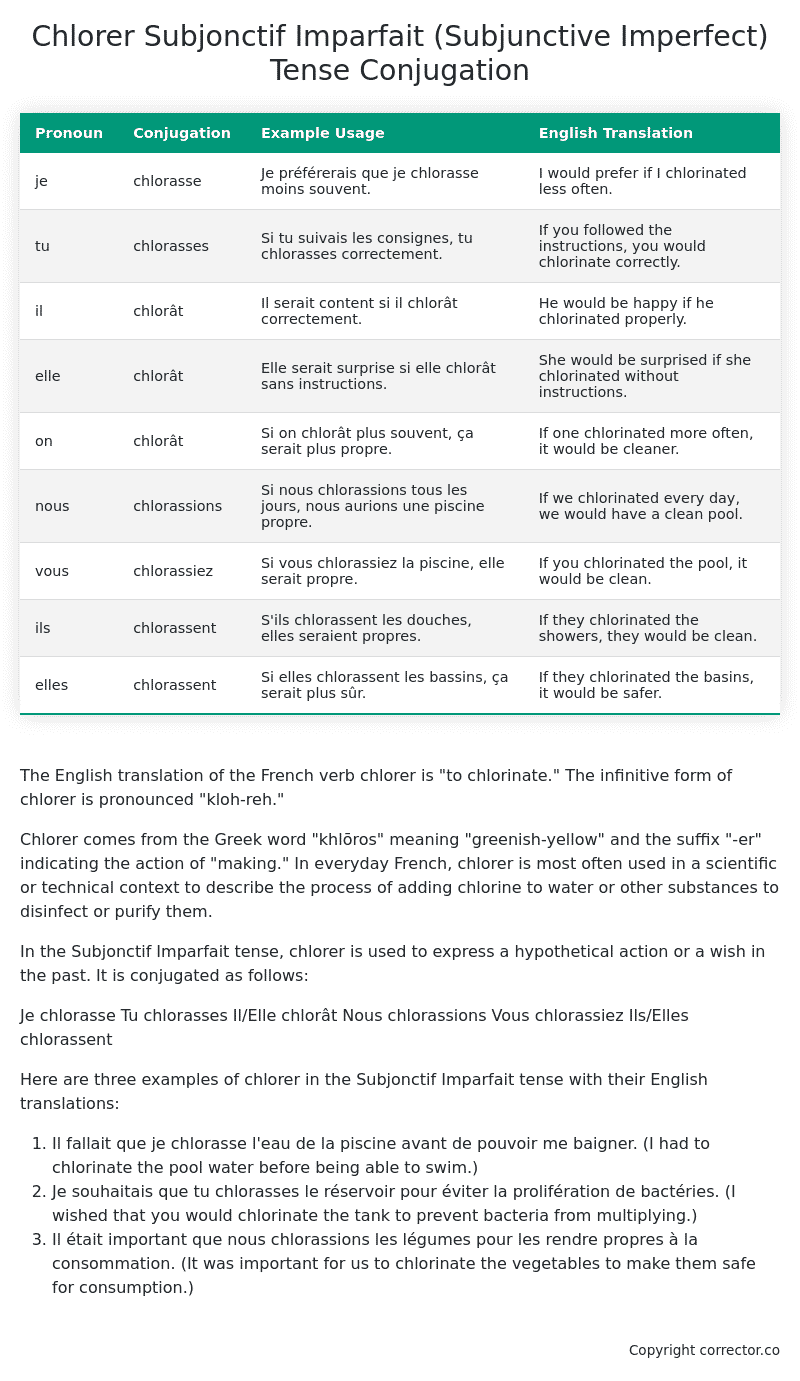Subjonctif Imparfait (Subjunctive Imperfect) Tense Conjugation of the French Verb chlorer
Introduction to the verb chlorer
The English translation of the French verb chlorer is “to chlorinate.” The infinitive form of chlorer is pronounced “kloh-reh.”
Chlorer comes from the Greek word “khlōros” meaning “greenish-yellow” and the suffix “-er” indicating the action of “making.” In everyday French, chlorer is most often used in a scientific or technical context to describe the process of adding chlorine to water or other substances to disinfect or purify them.
In the Subjonctif Imparfait tense, chlorer is used to express a hypothetical action or a wish in the past. It is conjugated as follows:
Je chlorasse
Tu chlorasses
Il/Elle chlorât
Nous chlorassions
Vous chlorassiez
Ils/Elles chlorassent
Here are three examples of chlorer in the Subjonctif Imparfait tense with their English translations:
- Il fallait que je chlorasse l’eau de la piscine avant de pouvoir me baigner. (I had to chlorinate the pool water before being able to swim.)
- Je souhaitais que tu chlorasses le réservoir pour éviter la prolifération de bactéries. (I wished that you would chlorinate the tank to prevent bacteria from multiplying.)
- Il était important que nous chlorassions les légumes pour les rendre propres à la consommation. (It was important for us to chlorinate the vegetables to make them safe for consumption.)
Table of the Subjonctif Imparfait (Subjunctive Imperfect) Tense Conjugation of chlorer
| Pronoun | Conjugation | Example Usage | English Translation |
|---|---|---|---|
| je | chlorasse | Je préférerais que je chlorasse moins souvent. | I would prefer if I chlorinated less often. |
| tu | chlorasses | Si tu suivais les consignes, tu chlorasses correctement. | If you followed the instructions, you would chlorinate correctly. |
| il | chlorât | Il serait content si il chlorât correctement. | He would be happy if he chlorinated properly. |
| elle | chlorât | Elle serait surprise si elle chlorât sans instructions. | She would be surprised if she chlorinated without instructions. |
| on | chlorât | Si on chlorât plus souvent, ça serait plus propre. | If one chlorinated more often, it would be cleaner. |
| nous | chlorassions | Si nous chlorassions tous les jours, nous aurions une piscine propre. | If we chlorinated every day, we would have a clean pool. |
| vous | chlorassiez | Si vous chlorassiez la piscine, elle serait propre. | If you chlorinated the pool, it would be clean. |
| ils | chlorassent | S’ils chlorassent les douches, elles seraient propres. | If they chlorinated the showers, they would be clean. |
| elles | chlorassent | Si elles chlorassent les bassins, ça serait plus sûr. | If they chlorinated the basins, it would be safer. |
Other Conjugations for Chlorer.
Le Present (Present Tense) Conjugation of the French Verb chlorer
Imparfait (Imperfect) Tense Conjugation of the French Verb chlorer
Passé Simple (Simple Past) Tense Conjugation of the French Verb chlorer
Passé Composé (Present Perfect) Tense Conjugation of the French Verb chlorer
Futur Simple (Simple Future) Tense Conjugation of the French Verb chlorer
Futur Proche (Near Future) Tense Conjugation of the French Verb chlorer
Plus-que-parfait (Pluperfect) Tense Conjugation of the French Verb chlorer
Passé Antérieur (Past Anterior) Tense Conjugation of the French Verb chlorer
Futur Antérieur (Future Anterior) Tense Conjugation of the French Verb chlorer
Subjonctif Présent (Subjunctive Present) Tense Conjugation of the French Verb chlorer
Subjonctif Passé (Subjunctive Past) Tense Conjugation of the French Verb chlorer
Subjonctif Imparfait (Subjunctive Imperfect) Tense Conjugation of the French Verb chlorer (this article)
Subjonctif Plus-que-parfait (Subjunctive Pluperfect) Tense Conjugation of the French Verb chlorer
Conditionnel Présent (Conditional Present) Tense Conjugation of the French Verb chlorer
Conditionnel Passé (Conditional Past) Tense Conjugation of the French Verb chlorer
L’impératif Présent (Imperative Present) Tense Conjugation of the French Verb chlorer
L’infinitif Présent (Infinitive Present) Tense Conjugation of the French Verb chlorer
Struggling with French verbs or the language in general? Why not use our free French Grammar Checker – no registration required!
Get a FREE Download Study Sheet of this Conjugation 🔥
Simply right click the image below, click “save image” and get your free reference for the chlorer Subjonctif Imparfait tense conjugation!

Chlorer – About the French Subjonctif Imparfait (Subjunctive Imperfect) Tense
Formation
Common Everyday Usage Patterns
Interactions with Other Tenses
Subjonctif Présent
Indicatif Passé Composé
Conditional
Conditional Perfect
Summary
I hope you enjoyed this article on the verb chlorer. Still in a learning mood? Check out another TOTALLY random French verb conjugation!


